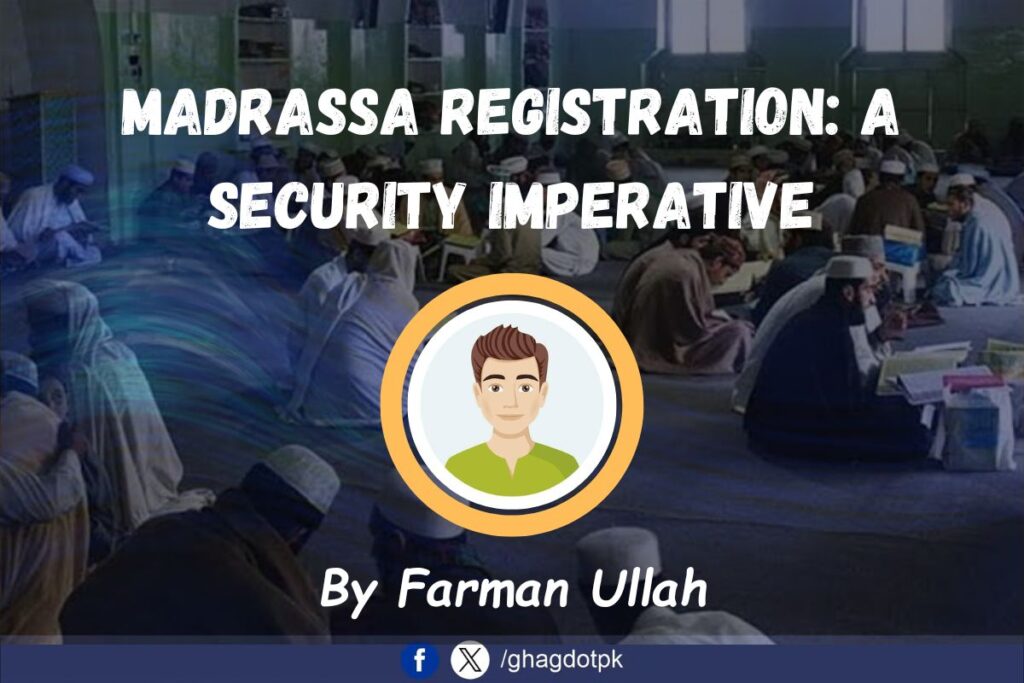By Farman Ullah
Madrassas, Islamic seminaries, have played a crucial role in the religious and educational fabric of Pakistan. With over 60,000 registered and unregistered madrassas operating across the country, these institutions contribute significantly to the moral and educational upbringing of millions of students. However, the absence of a standardized framework for their operation has often led to controversies, particularly about peace and security.
Historical Context of Madrassas in Pakistan
Madrassas have existed in the Indian subcontinent for centuries, serving as centers of Islamic learning. Post-independence, Pakistan inherited a network of madrassas that expanded significantly during the 1980s, fueled by funding from local and international donors during the Afghan-Soviet war. Many madrassas became hubs for ideological indoctrination, promoting jihadist narratives to recruit fighters against the Soviet forces.
The state’s negligence in regulating these institutions allowed extremist ideologies to infiltrate some madrassas, contributing to the rise of militancy. In the post-9/11 era, madrassas came under global scrutiny for their alleged links to terrorism, prompting demands for reforms.
The Case for Madrassa Registration
Addressing Extremism
Registration ensures oversight over the curriculum taught in madrassas. According to a 2023 report, many unregistered madrassas still operate without accountability, some allegedly promoting sectarianism and extremist ideologies. By bringing them under a unified regulatory framework, the government can monitor and modify curricula to emphasize peace, tolerance, and national integration.
Streamlining Funding Channels
Many madrassas rely on donations, both domestic and international. Registration enables transparency in financial transactions, ensuring funds are not misused for unlawful activities.
Integrating Modern Education
Registered madrassas can incorporate modern subjects such as science, mathematics, and information technology alongside religious studies. This integration prepares students for the job market, reducing unemployment and frustration that could otherwise lead to radicalization
Improving Law Enforcement
Unregistered madrassas often lack records of their students and staff, complicating law enforcement efforts. Registration ensures that all madrassas maintain proper documentation, helping authorities prevent the misuse of these institutions for illegal activities.
Challenges to Madrassa Registration
Despite the apparent benefits, madrassa registration has faced resistance from various quarters. Religious organizations often view state intervention as an infringement on their autonomy. Additionally, the lack of political will and coordination between federal and provincial authorities has slowed progress. According to a report published in 2024, less than 50% of madrassas in Pakistan were registered despite several government initiatives.
Government Efforts and Recommendations
The Pakistani government has made several attempts to regulate madrassas. Under the National Action Plan (NAP) launched in 2015, madrassa reforms were prioritized, yet implementation has been inconsistent. In 2023, the Ministry of Religious Affairs launched a campaign to digitize madrassa records, aiming for greater transparency.
The government must collaborate with religious scholars to ensure buy-in from stakeholders.
Allocate resources to modernize madrassa infrastructure.
Strengthen provincial oversight to ensure compliance.
Create awareness campaigns highlighting the benefits of registration.
The ongoing issue of registration
The ongoing issue of madrasa registration in Pakistan has become a contentious topic, particularly involving the Jamiat Ulema-e-Islam-Fazl (JUI-F) led by Maulana Fazlur Rehman. The government passed the Societies Registration (Amendment) Act, 2024, requiring all madrasas to register within six months and submit annual educational and audit reports. However, the delay in the president’s assent to this bill has caused significant tensions.
Maulana Fazlur Rehman and JUI-F see the registration as part of broader efforts to regulate madrasas but have expressed concerns about potential interference in their autonomy. They warn of protests, including a possible Islamabad march if the government fails to approve the bill promptly. Maulana Fazl also criticized the delay, calling it a disregard for parliamentary supremacy. This issue has prompted political discussions, with PPP leader Bilawal Bhutto Zardari assuring Maulana Fazl of his support in addressing these concerns with the government.
The bill aims to ensure transparency and standardization in madrasas while preserving their role in providing religious education. However, the delay has sparked fears among madrasa administrators of increased state interference, which Maulana Fazl has termed as a move to create divisions among clerics.






